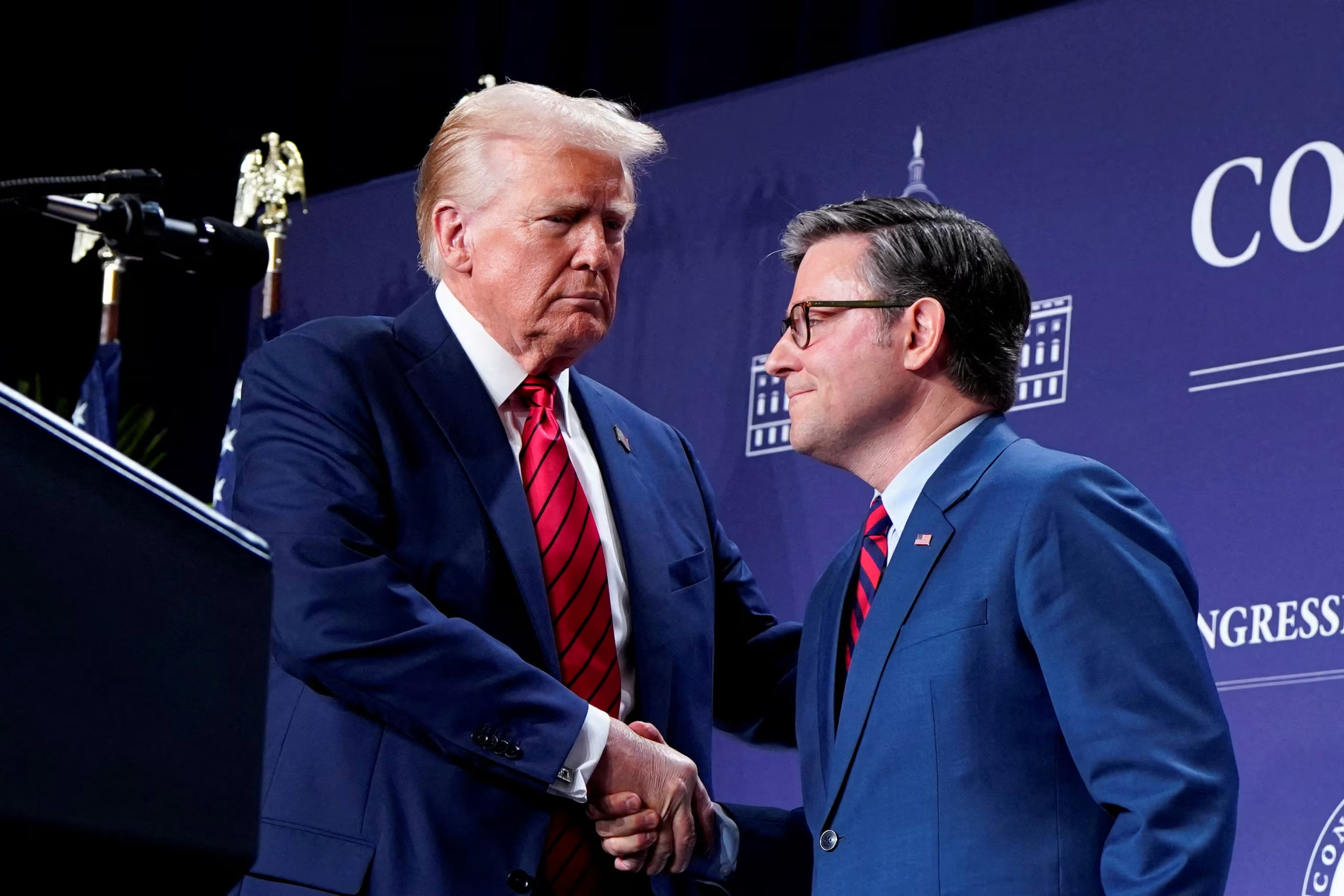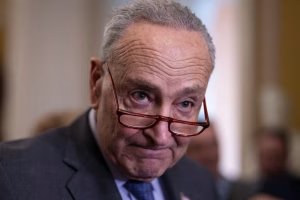A Party Split Wide Open
Democrats walked into the shutdown convinced they could break the GOP. They believed the media would carry their message. They assumed Republicans would fold under pressure, especially with a Democrat-controlled Senate. But none of that happened.
Instead, the shutdown dragged on for more than forty days. And when it finally crashed to an end, Democrats were bruised, angry, and turning on each other faster than anyone in Washington expected.
What started as a stunt to force Republicans into expanding Obamacare subsidies ended as one of the most embarrassing retreats the Democratic Party has seen in years.
And the worst part for them?
They were the ones who blinked.
Not Trump. Not the GOP.
This wasn’t just a legislative loss. It was a meltdown — one that exposed how divided, leaderless, and outmatched Democrats are heading into the next big fight.
Trump Held the Line — And Democrats Never Had a Plan
From the very beginning, President Trump made his position clear:
He wasn’t going to fund illegal-alien health care.
He wasn’t going to prop up NPR.
And he wasn’t going to write a blank check for every progressive wishlist item tossed into the talks.
He said “no.”
And he never moved.
Democrats, on the other hand, entered the shutdown without a strategy. They relied on media pressure, emotion, and the assumption that Republicans would eventually cave — because in the past, they often did.
But this time?
Not a chance.
Republicans stayed united. Even the moderates held firm. They understood the stakes, and they backed the president every step of the way.
Meanwhile, Democrats lost control of the message. Their talking points crumbled. Their leaks sounded desperate. Their base grew irritated. Their leaders grew confused.
And while Democrats flailed, the White House stayed steady.
Schumer’s Stunning Miscalculation
Chuck Schumer believed the shutdown would energize his party. Instead, it broke it.
Eight Democrats — plus one independent who caucuses with them — abandoned Schumer and joined Republicans to move the House bill forward. Seven of those Democrats don’t face re-election in 2026, which tells you everything you need to know.
When politicians feel safe, they tell the truth with their votes.
And the truth was simple:
Schumer’s strategy was a failure.
His caucus didn’t believe in the plan.
They didn’t think it would work.
And they didn’t want to be tied to him when the collapse came.
It was a humiliating moment for Schumer. The kind that sticks. The kind that becomes a warning sign the next time he tries to rally the troops.
Even Democrats on Capitol Hill are saying out loud what they used to whisper:
Maybe it’s time for him to go.
Democrats Turn Their Anger Inward
When a party loses a fight this big, they look for someone to blame. And Democrats didn’t waste a second.
Sen. Chris Murphy called the vote “a mistake.”
Bernie Sanders declared it “a very bad night.”
Ro Khanna flat-out said Schumer “is no longer effective and should be replaced.”
Rep. Seth Moulton slammed him for failing to unite the caucus.
And that’s just Congress.
The meltdown hit TV, too.
On The View, Sunny Hostin blasted Schumer’s leadership.
Activists piled on.
Party strategists panicked.
Everyone had a complaint.
Nobody had a solution.
It was a full-scale civil war — one the Democratic Party didn’t need, but one they absolutely created.
The SNAP Talking Point Falls Apart
Throughout the shutdown, Democrats kept hammering one message:
“Republicans are starving Americans by refusing to fund food stamps.”
It sounded emotional.
Powerful.
Urgent.
But it wasn’t true.
Republicans offered to fund SNAP 15 separate times.
Democrats rejected every single offer.
Not because they cared about the funding.
But because they wanted the pain.
They admitted they viewed SNAP as a “bargaining chip,” something to hold hostage until Republicans cracked.
It was cold.
It was political.
And it backfired.
By the end, even some of their own voters were asking why their party kept saying no to its own demands.
A Shutdown That Hurt Millions — For Nothing
Government workers went without pay.
TSA lines stretched into chaos.
Air traffic controllers were exhausted.
Federal assistance programs stalled.
Airports struggled.
Families struggled.
Businesses struggled.
And for what?
Democrats walked away with nothing except a vague promise of a vote next month — a vote that almost nobody believes will change a thing.
They shut down the government to protect Obamacare subsidies.
And they didn’t even get that.
That’s not strategy.
That’s political malpractice.
Why Democrats Keep Losing
The truth is simple:
You need three things to win a fight like this:
A plan, a message, and a leader.
Democrats had none of the above.
Trump had all three.
Schumer misread the moment.
Jeffries couldn’t rally his caucus.
And the party’s progressive wing held everyone hostage until the entire strategy collapsed.
Republicans, meanwhile, stayed united from start to finish.
They didn’t panic.
They didn’t splinter.
They didn’t flinch.
That alone tells you how the next round of battles may go.
A Warning Sign for 2026
A party at war with itself doesn’t win elections.
And right now, Democrats have two leaders — Schumer and Jeffries — who can’t control their own members, let alone the national message.
They look weak.
Divided.
Directionless.
And the American people saw all of it.
This shutdown wasn’t just a political loss.
It was a preview.
If Democrats don’t fix their leadership crisis, they’re walking into 2026 with two broken engines and no pilot.

James Jenkins is a celebrated Pulitzer Prize-winning author whose work has reshaped the way readers think about social justice and human rights in America. Raised in Atlanta, Georgia, James grew up in a community that instilled in him both resilience and a strong sense of responsibility toward others. After studying political science and creative writing at Howard University, he worked as a journalist covering civil rights issues before dedicating himself fully to fiction. His novels are known for their sharp, empathetic portraits of marginalized communities and for weaving personal stories with broader political realities. Jenkins’s breakout novel, Shadows of Freedom, won national acclaim for its unflinching look at systemic inequality, while his more recent works explore themes of identity, resilience, and the fight for dignity in the face of oppression. Beyond his novels, James is an active public speaker, lecturing at universities and participating in nonprofit initiatives that support literacy and community empowerment. He believes that storytelling is a way to preserve history and inspire change. When not writing, James enjoys jazz music, mentoring young writers, and traveling with his family to explore cultures and stories around the world.









